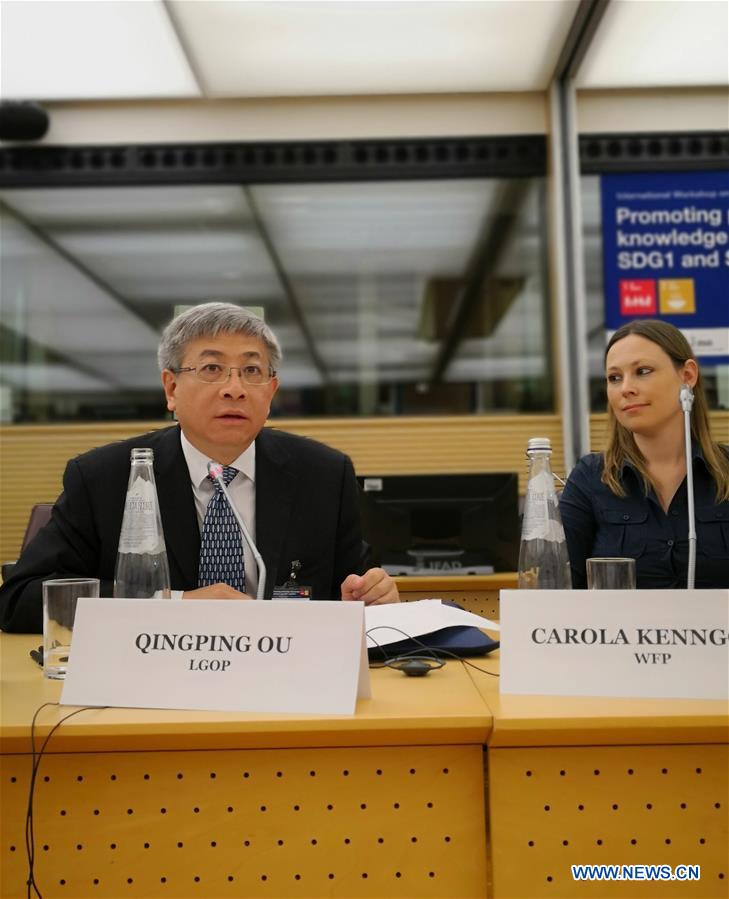Knowledge-sharing key to eradicate global hunger, poverty: workshop at IFAD
Xinhua, September 30, 2021 Adjust font size:
Ou Qingping (L), Vice Minister of China's State Council Leading Group Office of Poverty Alleviation and Development (LGOP), addresses an ad-hoc workshop at the International Fund for Agriculture Development (IFAD) headquarters in Rome, Italy, on June 5, 2018. A robust partnership built on knowledge sharing would be crucial to eradicate poverty and hunger by 2030, representatives from governments and UN agencies said here on Tuesday during the ad-hoc workshop held at the International Fund for Agriculture Development headquarters. (Xinhua/Chen Zhanjie)
A robust partnership built on knowledge sharing would be crucial to eradicate poverty and hunger by 2030, representatives from governments and UN agencies said here on Tuesday during an ad-hoc workshop held at the International Fund for Agriculture Development (IFAD) headquarters.
Attended by some 90 experts, the event was co-organized by International Poverty Reduction Center in China (IPRCC) and China Internet Information Center (CIIC), and by the three UN agencies based in Rome, namely World Food Programme (WFP), Food and Agriculture Organization (FAO), and IFAD.
High representatives from Ghana, Senegal, Kenya also joined the debate, which focused on how to improve ongoing strategies to achieve the first two Sustainable Development Goals (SDGs) -- eradicate hunger and poverty -- provided by the Agenda 2030.
Different panels gave one major answer: build a multi-disciplinary integrated approach by learning from countries that have proved successful already and exchanging information and experiences as much as possible.
This was what the organizers pledged to do.
In a joint communique, the Chinese representatives along with FAO, IFAD, and WFP committed in fact to "explore opportunities to develop and strengthen their partnership" on several perspectives.
A crucial one would be "to share research findings, successful experiences, and best practices...relating to poverty reduction, rural transformation, eradication of hunger, and improvement of food security," it said.
They also agreed to organize two forums each year from now on -- one in Beijing and one in Rome -- to build a permanent framework for such a regular dialogue.
With its good results in taking out millions of citizens from poverty in a relative short span, China represented both a global example and a major driver of the campaign towards poverty and hunger eradication, experts acknowledged.
In the last five years, "China yielded decisive progress in the uphill anti-poverty campaign," Ou Qingping, Vice Minister of China's State Council Leading Group Office of Poverty Alleviation and Development (LGOP), told the audience.
He explained China's impoverished population fell from 98.99 million in 2012 to 30.46 million in 2017, which meant some 13.7 million lifted out of poverty on average each year.
"Poverty incidence rate dropped from 10.2 percent to 3.1 percent (in the same period)," Ou said.
A crucial role in coordinating effective policies and directing anti-poverty investments was being played by the central government, according to the official.
"Central and provincial fiscal input from 2013 to 2017 reached a total 464.7 billion yuan (72.55 billion U.S. dollars) as China's special poverty reduction fund," Ou said.
Meanwhile, Beijing has been an active partner in poverty reduction cooperation with both multilateral organizations (such as the Rome-based UN agencies) and developing countries in Africa, Latina America and Southeast Asia.
Despite the many achievements reached in the past decades, in fact, a UN official recalled the global situation still showed "daunting challenges".
"Inequalities are still pervasive, and about 783 million people continue to live in extreme poverty," said economist Benjamin Davis, team leader of FAO Strategic Programme to Reduce Rural Poverty.
Hunger was also on the rise, with some 815 million people considered chronically food-insecure in 2016 from 777 million in 2015, mainly due to conflicts and climate change.
In such a context, the official stressed that progresses made by some countries towards the SDG1 and SDG2 -- no poverty and zero hunger, respectively -- indicated the path.
"Countries that have developed successful policies -- as we have heard in the case of China -- serve as an example for others, and especially those with a similar context and social-economic background," Davis said.
"Along this line, knowledge sharing through South-South and Triangular Cooperation is a very powerful tool to facilitate the exchange of lessons learnt and best practices."
As part of their efforts in boosting knowledge sharing, parties at the workshop presented the "Global Solicitation and Challenge Prize on Best Poverty Reduction Practices," launched at a previous forum held in Beijing in late May.
The initiative -- set up by the three Rome-based UN agencies, China's CIIC and IPRCC, World Bank, and Asian Development Bank -- aims at gathering 100 meaningful case studies on poverty reduction from organizations and individuals around the world.
All of the case studies selected during the campaign from May 3 to Aug. 3 will be showcased in the Global Poverty Reduction Online Knowledge Sharing Database launched by China in 2017, officials at the event said. (1 U.S. dollar = 6.4 Chinese yuan)

b5800d52-7805-4adb-bc80-fc21c0a0f6ff.jpg)
